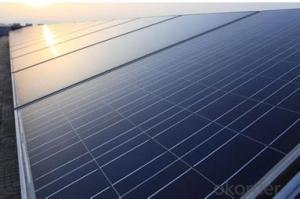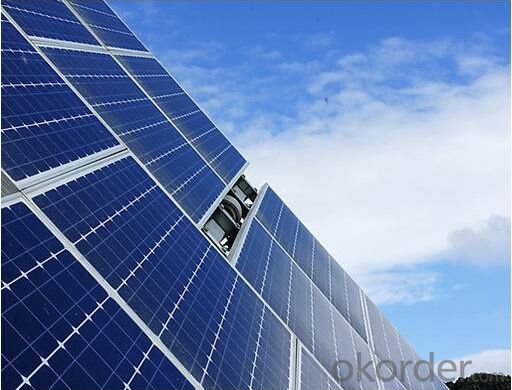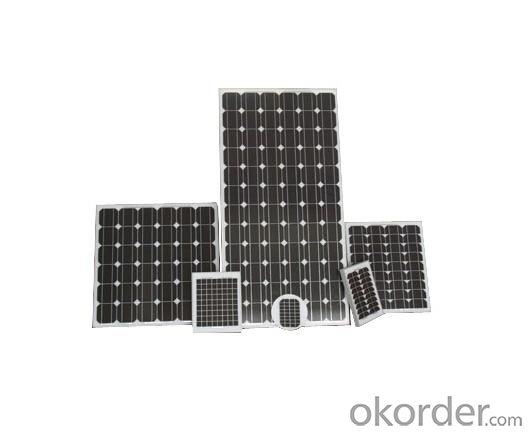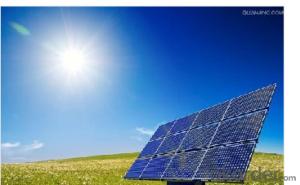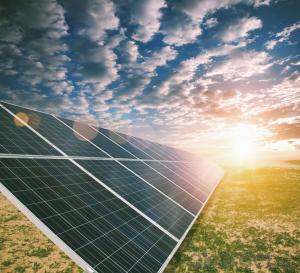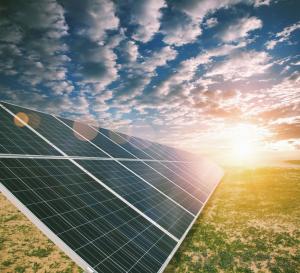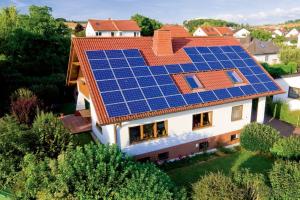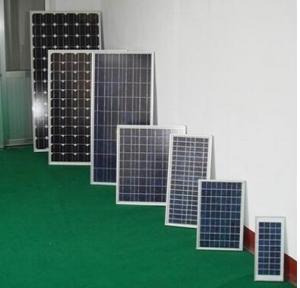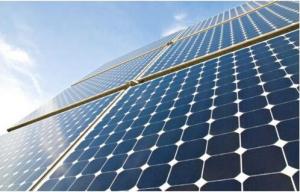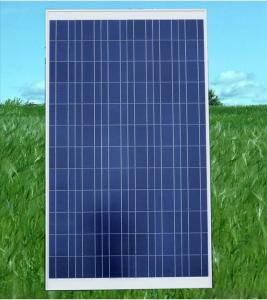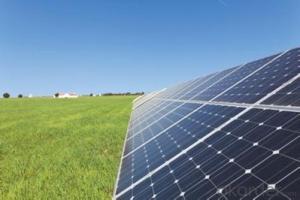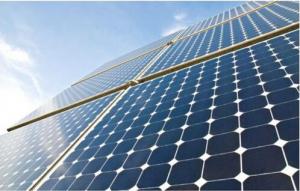Solar Panels Central Coast - Polycrystalline Silicon Solar Modules 48 Cell 195w
- Loading Port:
- China Main Port
- Payment Terms:
- TT or LC
- Min Order Qty:
- 19500 watt
- Supply Capability:
- 10000000 watt/month
OKorder Service Pledge
OKorder Financial Service
You Might Also Like
1. Structure of Polycrystalline Silicon Solar Modules 48Cell-195W Description
Solar panel refers either to a photovoltaics (PV) module, a solar hot water panel, or to a set of solar photovoltaics modules electrically connected and mounted on a supporting structure. A PV module is a packaged, connected assembly of solar cells.
Solar panels can be used as a component of a larger photovoltaic system to generate and supply electricity in commercial and residential applications.
Each module is rated by its DC output power under standard test conditions, and typically ranges from 100 to 320 watts.
The efficiency of a module determines the area of a module given the same rated output – an 8% efficient 230 watt module will have twice the area of a 16% efficient 230 watt module.
There are a few solar panels available that are exceeding 19% efficiency.
A single solar module can produce only a limited amount of power; most installations contain multiple modules.
2. Main Features of the Polycrystalline Silicon Solar Modules 48Cell-195W
• WARRANTIES
- Limited power warranty1: 1 year at 98% of the minimal rated power output, 10 years at 92% of the minimal rated power output, 25 years at 82% of the minimal rated power output.
1In compliance with our Warranty Terms and Conditions.
*QUALIFICATIONS & CERTIFICATES
IEC 61215, IEC 61730, MCS, CE, ISO 9001:2008, ISO 14001:2004, BS OHSAS 18001:2007, PV Cycle, SA 8000
.
3. Polycrystalline Silicon Solar Modules 48Cell-195W Images
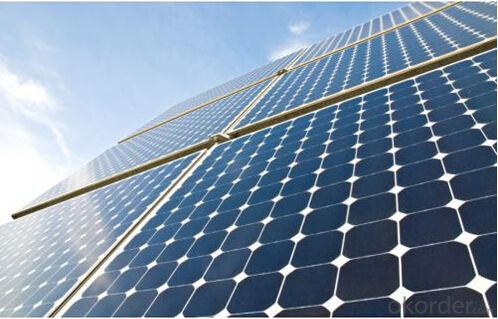
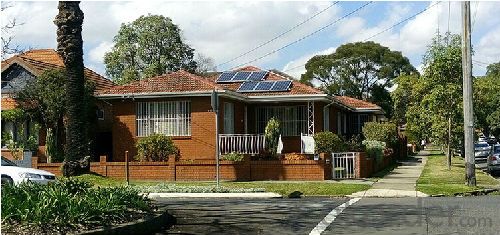
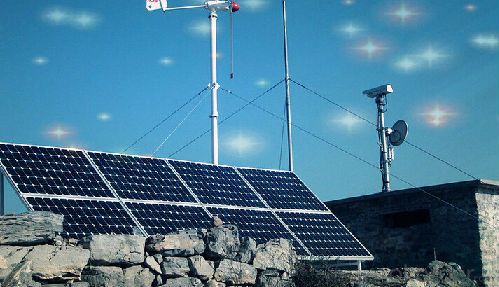
4. Polycrystalline Silicon Solar Modules 48Cell-195W Specification
ELECTRICAL PERFORMANCE | |||
Power output | P max | W | 195 |
Power output tolerances | ΔP max | W | 0/+5 |
Module effi ciency | η m | % | 14.7 |
Voltage at Pmax | V mpp | V | 23.7 |
Current at Pmax | I mpp | A | 8.03 |
Open-circuit voltage | V oc | V | 30.1 |
Short-circuit current | I sc | A | 8.65 |
5. FAQ of Polycrystalline Silicon Solar Modules 48Cell-195W
Q1:Can we visit your factory?
A1:Sure,welcome at any time,seeing is believing.
Q2:Which payment terms can you accept?
A2:T/T,L/C,Moneygram,Paypal are available for us.
Q3:How to guarantee the Quality of the products?
A3:We have established the international advanced Quality management system,every link from raw material to final product we have strict
Quality test;We resolutely put an end to unQualified products flowing into the market. At the same time, we will provide necessary follow-up
service assurance.
- Q: What are solar panels?
- Solar panel is a generic term used to describe a device that collects and converts solar energy into electricity or heat. Photovoltaic module, used to generate electricity Solar thermal collector, used to generate heat Solar hot water panel, used to heat water, often in homes but i guess u mean the ones which generete electricity a photovoltaic module is a packaged interconnected assembly of photovoltaic cells, also known as solar cells. An installation of photovoltaic modules or panels is known as a photovoltaic array. Photovoltaic cells typically require protection from the environment. For cost and practicality reasons a number of cells are connected electrically and packaged in a photovoltaic module, while a collection of these modules that are mechanically fastened together, wired, and designed to be a field-installable unit are known as a photovoltaic panel or simply solar panel. A photovoltaic installation typically includes an array of photovoltaic modules or panels, an inverter, batteries (for off grid) and interconnected wiring.
- Q: The Physics club in our school is trying to convince the Board of Ed to install solar panels in our school, and i was just wondering if anyone with some experience or real expertise in solar energy. I need some points about their usefulness some real pros and cons on maintenance, etc. Anything will help. Personally i would be perfectly for the idea, but i heard that the overall cost of installing them is much higher than the cost of the energy saved and government subsidies, but ive only heard about this.
- nan
- Q: Can solar panels be installed on farmlands or agricultural fields?
- Yes, solar panels can be installed on farmlands or agricultural fields. In fact, many farmers and landowners are increasingly using their land for solar energy production as it can provide additional income and sustainable farming practices. Solar panels can be mounted on ground-mounted systems or integrated into structures like barns or sheds without interfering with farming operations. Additionally, solar installations can offer benefits such as reduced energy costs and promoting environmental sustainability in the agriculture sector.
- Q: I know absolutely nothing about electronics but have a lot of money. I am thinking of buying the Sunforce 3730 30W monocrystalline solar panel (the best I could find that was that size or smaller). What would be a good battery to go with it? I am thinking of buying a 2V Concorde Sun Xtender (again, the best I could find). But how many batteries will I need? I want enough batteries that it would take the solar panel 2 days to completely charge them from empty (bearing in mind the unavoidable inefficiencies like cloudiness/changing sun angles). Also, what other stuff would I need, like I hear something about a quot;charge controllerquot;? Any suggestions would be appreciated.
- If you are at a location/time where the panel will put out less power, you can adjust the battery size accordingly. And running a battery to empty is very bad for it's service life, so it's better to go a bit bigger.
- Q: . Does it really only cost $200 in contrast to $5000 or more?2. How much would it cost to build panels that would energize an entire average household? (washer, dryer, water heater, lights, fans, a/c)3. Is there a place to get the info on how to make them for free instead of paying E4E?4. Are the professional solar panels better? more efficient? 5. Will the electric company in So. Cal. really pay you?6. Do you have to be certified to do this professionally? or an electrician? If so what schools teach it?7. Would wind generators be of any use in So. Cal.? I mean don't you really need to get the fan spinning to get energy?8. Are there any extra unseen costs? (tools, energy converter, ect)9. How much is it to get an electrician to hook you to the grid?0. Is it better to hook to batteries or the grid? Pros, cons, why?
- Are there any extra unseen costs? (tools, energy converter, ect). Yes. Batteries or Inter-tie, charge controllers, inspections, wiring, inverter etc. 9. How much is it to get an electrician to hook you to the grid? Call for a quote. 0. Is it better to hook to batteries or the grid? Pros, cons, why? Batteries are expensive and only last several years. Maximum power is limited by the size of the inverter. Grid-tie eliminates the need for batteries but then you have to purchase a very expensive grid-tie inverter.
- Q: Can solar panels be used to power a swimming pool?
- Yes, solar panels can be used to power a swimming pool. Solar panels can convert sunlight into electricity, which can then be used to power various devices, including swimming pool pumps, heaters, and lights. By utilizing solar energy, pool owners can reduce their reliance on traditional electricity sources and lower their overall energy costs.
- Q: How do solar panels affect insurance rates?
- Solar panels can generally have a positive impact on insurance rates. While the installation of solar panels may slightly increase the dwelling coverage, the potential savings on electricity bills and the added value to the property can often outweigh any additional costs. Additionally, some insurance companies offer specialized policies and discounts for homes with solar panels, making it a favorable choice for homeowners.
- Q: I want to be more self sufficient and get solar panels for electricity in a small house any tips will help. i need to know how many watts is enough and ect.
- Unless you're very rich, you won't be able to afford solar panels that can meet the average demand of a home. In the US, the average demand for a home is 920 kwh per month, which amounts to 3,833 Watt panels if you assume 8 hours of usable sunshine and don't take into account your location. At current installation rates that's easily a $9,65 project. If you assume a 25 year useful life, it amounts to a return of 3.3% per annum at 0 cents a kwh not counting the costs of repair, insurance, the inverter, any fees to the utility for net metering if any etc. You would be better off putting $9,65 into a mutual fund until better technology or government incentives came along, in some areas, the government subsidies can make it worth your while. Also, keep in mind that in many areas, the net metering arrangements only deducts the power you've generated from your bill so you would want to size the array to meet your base usage in order to get the most from your investments. So meeting your actual needs would result in a loss on the return as there will be months where your usage is less than your average. In theory, if you put $7,208.69 into a mutual fund expected to return 4.4% per annum then you could withdraw enough to pay each month's power bill for 25 years at $0.0 a kwh and therefore be self sufficient through financial means. You would get more mileage focusing on heating and hot water as heating and hot water is 75% of a home's energy use and can be addressed with lower cost technologies like passive solar and solar thermal panels. You have to put it into perspective, it's an investment and you want a return that's competitive with your investment opportunities.
- Q: Can solar panels be used to power a hospital?
- Yes, solar panels can be used to power a hospital. Solar panels generate electricity by converting sunlight into energy, which can be used to power various electrical systems in a hospital, such as lighting, medical equipment, and heating/cooling systems. Solar power can provide a reliable and sustainable source of energy for hospitals, reducing their dependence on traditional energy sources and helping to lower operational costs.
Send your message to us
Solar Panels Central Coast - Polycrystalline Silicon Solar Modules 48 Cell 195w
- Loading Port:
- China Main Port
- Payment Terms:
- TT or LC
- Min Order Qty:
- 19500 watt
- Supply Capability:
- 10000000 watt/month
OKorder Service Pledge
OKorder Financial Service
Similar products
Hot products
Hot Searches
Related keywords
